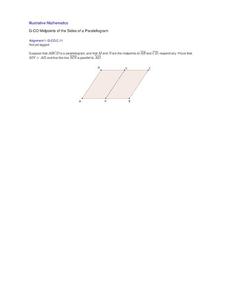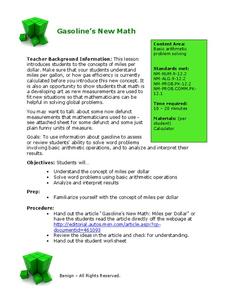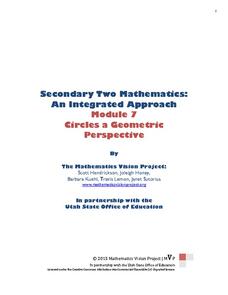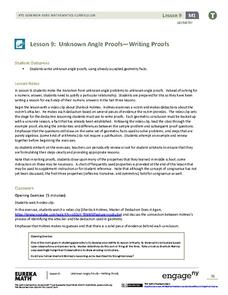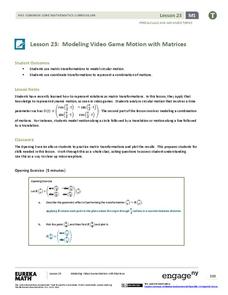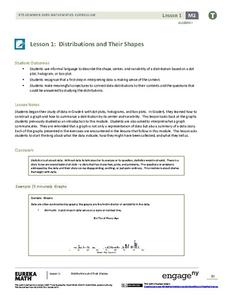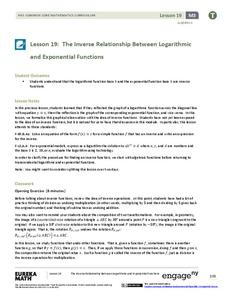Illustrative Mathematics
Midpoints of the Sides of a Paralellogram
This task asks learners to prove that the segment joining the midpoints of two sides of a parallelogram is both congruent and parallel to an adjacent side of the parallelogram. The activity would be good to use in a discussion about how...
Mathed Up!
Algebraic Fractions
Learn ways to simplify algebraic fractions with a video that reviews how to simplify rational expressions by canceling common factors and how to add and subtract simple rational expressions. A worksheet tests pupils' understanding of the...
EngageNY
Solve for Unknown Angles—Angles in a Triangle
Assist your class with each angle of geometry as they use exterior angles to form linear pairs with adjacent interior angles. They cover multiple vocabulary terms and work practice problems, complete with justifications, before taking an...
EngageNY
An Appearance of Complex Numbers 1
Complex solutions are not always simple to find. In the fourth lesson of the unit, the class extends their understanding of complex numbers in order to solve and check the solutions to a rational equation presented in the first lesson....
Beyond Benign
Got Gas
How much gas does it take to drive around town? The class uses a variety of mathematical procedures to take a look at the use of gas for transportation. Class members use a different unit to determine the cost of driving a car as opposed...
Curated OER
Celebrating the Universal Language of Numbers
Math games and activities spark the imagination while building crucial skills.
EngageNY
Characterize Points on a Perpendicular Bisector
Learn transformations through constructions! Pupils use perpendicular bisectors to understand the movement of a reflection and rotation. They discover that the perpendicular bisector(s) determine the line of reflection and the center of...
EngageNY
Adding and Subtracting Rational Expressions
There's a fine line between a numerator and a denominator! Learners find common denominators in order to add and subtract rational expressions. Examples include addition, subtraction, and complex fractions.
Mathematics Vision Project
Circles: A Geometric Perspective
Circles are the foundation of many geometric concepts and extensions - a point that is thoroughly driven home in this extensive unit. Fundamental properties of circles are investigated (including sector area, angle measure, and...
EngageNY
Secant Lines; Secant Lines That Meet Inside a Circle
Young mathematicians identify different cases of intersecting secant lines. They then investigate the case where secant lines meet inside a circle.
EngageNY
Unknown Angle Proofs—Writing Proofs
What do Sherlock Holmes and geometry have in common? Why, it is a matter of deductive reasoning as the class learns how to justify each step of a problem. Pupils then present a known fact to ensure that their decision is correct.
Mathematics Assessment Project
Representing and Combining Transformations
Transform your learners into master geometers with an activity that asks them to first complete an assessment task drawing the result after transformation of a given shape in the coordinate plane. They then use cards to represent...
EngageNY
The Geometric Effect of Some Complex Arithmetic 1
Translating complex numbers is as simple as adding 1, 2, 3. In the ninth lesson in a 32-part series, the class takes a deeper look at the geometric effect of adding and subtracting complex numbers. The resource leads pupils into what it...
EngageNY
End-of-Module Assessment Task - Algebra 1 (Module 2)
Check for understanding at the end of your descriptive statistics unit with an end-of-module assessment. It uses five questions to measure progress toward mastery of descriptive statistics standards. Each question is developed to address...
EngageNY
Modeling Video Game Motion with Matrices 2
The second day of a two-part lesson on motion introduces the class to circular motion. Pupils learn how to incorporate a time parameter into the rotational matrix transformations they already know. The 24th installment in the 32-part...
Visa
Rookie Lesson Module — Financial Football
Score a touchdown with an exciting game of financial football! Middle schoolers choose their favorite teams and play a virtual game of football as they answer various questions about economics.
EngageNY
Distributions and Their Shapes
What can we find out about the data from the way it is shaped? Looking at displays that are familiar from previous grades, the class forms meaningful conjectures based upon the context of the data. The introductory lesson to descriptive...
EngageNY
Inscribed Angle Theorem and Its Applications
Inscribed angles are central to the instructional activity. Young mathematicians build upon concepts learned in the previous instructional activity and formalize the Inscribed Angle Theorem relating inscribed and central angles. The...
Mathematics Assessment Project
Sharing Costs Equitably: Traveling to School
Drive or take the school bus? Class members determine the amount each student would have to pay in a carpool situation. They then evaluate the cost in a set of provided examples. I think I'd rather take the school bus!
Mathematics Assessment Project
Evaluating Statements about Probability
Learners first complete an assessment task where they assess statements on probability. They then sort cards containing probability statements as being either true or false.
Mathematics Assessment Project
Building and Solving Linear Equations
Young scholars write and solve linear equations in one variable based on descriptions of the operations that are applied to the unknown variable in an algebra machine. They then create their own problems for classmates to solve.
EngageNY
The Inverse Relationship Between Logarithmic and Exponential Functions
Introducing inverse functions! The 20th installment of a 35-part lesson encourages scholars to learn the definition of inverse functions and how to find them. The lesson considers all types of functions, not just exponential and...
EngageNY
Getting a Handle on New Transformations 2
Use 2x2 matrices to move along a line. The second day of a two-day lesson is the 28th installment in a 32-part unit. Pupils work together to create and solve systems of equations that will map a transformation to a given point. The...
Fluence Learning
Divide Shapes
Let's partition rectangles into equal parts. Assess learners on their ability to divide shapes into equal parts, and their ability to explain their thinking.


